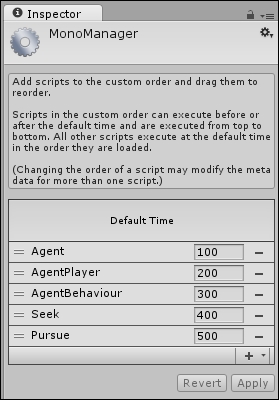Before creating our behaviors, we need to code the stepping stones that help us not only to create only intelligent movement, but also to build a modular system to change and add these behaviors. We will create custom data types and base classes for most of the algorithms covered in this chapter.
Our first step is to remember the update function order of execution:
UpdateLateUpdate
Also, it's important to refresh so that we can select the scripts' order of execution. For our behaviors to work as intended, the rules for ordering are as follows:
- Agent scripts
- Behavior scripts
- Behaviors or scripts based on the previous ones

This is an example of how to arrange the order of execution for the movement scripts. We need to pursue derives from Seek, which derives from AgentBehaviour.
We need to create three classes: Steering, AgentBehaviour, and Agent:
Steeringserves as a custom data type for storing the movement and rotation of the agent:using UnityEngine; using System.Collections; public class Steering { public float angular; public Vector3 linear; public Steering () { angular = 0.0f; linear = new Vector3(); } }- Create the
AgentBehaviourclass, which is the template class for most of the behaviors covered in this chapter:using UnityEngine; using System.Collections; public class AgentBehaviour : MonoBehaviour { public GameObject target; protected Agent agent; public virtual void Awake () { agent = gameObject.GetComponent<Agent>(); } public virtual void Update () { agent.SetSteering(GetSteering()); } public virtual Steering GetSteering () { return new Steering(); } } - Finally,
Agentis the main component, and it makes use of behaviors in order to create intelligent movement. Create the file and its barebones:using UnityEngine; using System.Collections; public class Agent : MonoBehaviour { public float maxSpeed; public float maxAccel; public float orientation; public float rotation; public Vector3 velocity; protected Steering steering; void Start () { velocity = Vector3.zero; steering = new Steering(); } public void SetSteering (Steering steering) { this.steering = steering; } } - Next, we code the
Updatefunction, which handles the movement according to the current value:public virtual void Update () { Vector3 displacement = velocity * Time.deltaTime; orientation += rotation * Time.deltaTime; // we need to limit the orientation values // to be in the range (0 – 360) if (orientation < 0.0f) orientation += 360.0f; else if (orientation > 360.0f) orientation -= 360.0f; transform.Translate(displacement, Space.World); transform.rotation = new Quaternion(); transform.Rotate(Vector3.up, orientation); } - Finally, we implement the
LateUpdatefunction, which takes care of updating the steering for the next frame according to the current frame's calculations:public virtual void LateUpdate () { velocity += steering.linear * Time.deltaTime; rotation += steering.angular * Time.deltaTime; if (velocity.magnitude > maxSpeed) { velocity.Normalize(); velocity = velocity * maxSpeed; } if (steering.angular == 0.0f) { rotation = 0.0f; } if (steering.linear.sqrMagnitude == 0.0f) { velocity = Vector3.zero; } steering = new Steering(); }
The idea is to be able to delegate the movement's logic inside the GetSteering() function on the behaviors that we will later build, simplifying our agent's class to a main calculation based on those.
Besides, we are guaranteed to set the agent's steering value before it is used thanks to Unity script and function execution orders.
This is a component-based approach, which means that we have to remember to always have an Agent script attached to GameObject for the behaviors to work as expected.
